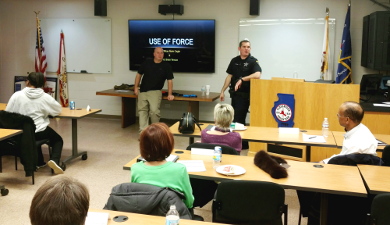At a time when the law enforcement profession often finds itself the target of public criticism, it’s possible for police officers and the residents they serve to respectfully discuss how and why police do what they do.
This is evident in Flossmoor, where the nine-year-old Citizen Police Academy has 20 residents meeting each week with police officers. Participants get an inside look at how a police department works and learn about the challenges faced by its officers.
a discussion about the use of force by police during a
recent session of the Flossmoor Citizen Police Academy.
(Photo by R.L. Anderson)
At a time when the law enforcement profession often finds itself the target of public criticism, it’s possible for police officers and the residents they serve to respectfully discuss how and why police do what they do.
This is evident in Flossmoor, where the nine-year-old Citizen Police Academy has 20 residents meeting each week with police officers. Participants get an inside look at how a police department works and learn about the challenges faced by its officers.
Each year a new class of academy members can express concerns about complex law enforcement issues, including when use of deadly force is justified.
“Some of them came because they have maybe a negative opinion and want to sit here and have a conversation with us. We welcome that,” said Flossmoor Police Officer Marc Cagle. “Others think law enforcement is interesting and they always wanted to know more about it.”
Cagle said sessions range from the challenges of using firearms, including some work at a shooting range; an attorney discussing the judicial process; how investigations are conducted; current scams to watch for; accident reconstruction; and demonstrations by canine units.
“For residents to be here and to listen to us and see how things are done and to ask questions, that’s a gift for us,” Cagle said. “We want to build a bond with residents.”
A recent session dealt with the many issues that arise when deadly force is used by police officers.
Sergeant Brian Tencza told the academy’s students such use is justified based on what is “objectively reasonable for the officer at the time of the event.”
Tencza said when using deadly force, “The individual officer makes the decision. He does not require approval from a higher authority. Deadly force can be used to stop a threat.”
He added, “Where feasible, some warning is to be given.”
Tencza also emphasized an officer has only a split-second to weigh critical factors.
“What is reasonable for me? I might get sued; I might get fired; I might die,” he said, adding, “An officer has to decide in the moment what is reasonable. Others have the benefit of 20-20 hindsight.”
The complex issue inevitably turns to recent high-profile police cases in Ferguson, Mo., Waller County, Texas, and the Laquan McDonald shooting in Chicago. Some of the students are not convinced police acted appropriately in those cases. Others said they have a better appreciation of the officer’s perspective after joining the academy.
“Interest in our academy spiked after Ferguson,” Tencza said. ”We are facilitating spirited and respectful discussions.”The veteran officer stated the public’s opinion about such cases is negatively influenced by media coverage of the 2014 incident.
“The media shows how some cops are bad, but you don’t see similar stories about bad doctors, firemen, clergy, baseball players, preachers and teachers,” said Tencza. “The media never have the full story when it is first reported. If they did in Ferguson, it would have turned out different.”
Tencza stated almost all occurrences of police officers using deadly force are justified, and said some of the fault lies with the victims.
“Ninety-nine times out of 100, people would not have been hurt if they had done what the police told them to do,” he said.
He also welcomes the use of video cameras.
“Videotaping vindicates the cops,” he explained. “We follow the law of what is objectively reasonable for the cop at that time.”
The session also covered the option of deploying non-deadly force including hand-to-hand force, tasers and batons, with a demonstration on tasers.
Resident Jessica Newby, considering a career in law enforcement or as a firefighter, says she has benefited from the academy.
“I learned you can’t form an opinion based only on what you see on TV. You need to hear both sides before making a judgment,” she said.
Academy member Delores McLendon said while she believes some officers unnecessarily use force, “Even though I know many police officers in Chicago and many are from my family, I now have better insights into what they have to deal with.”
The Citizen Police Academy has an alumni group and Flossmoor police stay in contact.
“They might be in a position to help us someday,” Cagle said. “Or if they see something out their window, they may have a better idea of what might be going on, not spreading a negative story about law enforcement.”
Upon completion of the academy each year, participants are recognized by the Flossmoor Village Board. There is also a class party.
Resident Julius Baldridge said while the academy has helped him understand the point of view of police officers, problems run deeper than how police perform.
“I want to see things be better,” Baldridge said. “Not just with the police, but with the schools and our communities across the board. We need to have better relationships. Let’s just be better.”




